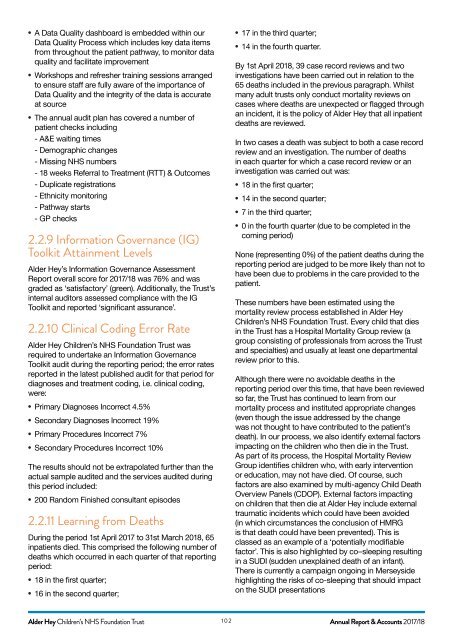AH ANNUAL REPORT 2018
You also want an ePaper? Increase the reach of your titles
YUMPU automatically turns print PDFs into web optimized ePapers that Google loves.
• A Data Quality dashboard is embedded within our<br />
Data Quality Process which includes key data items<br />
from throughout the patient pathway, to monitor data<br />
quality and facilitate improvement<br />
• Workshops and refresher training sessions arranged<br />
to ensure staff are fully aware of the importance of<br />
Data Quality and the integrity of the data is accurate<br />
at source<br />
• The annual audit plan has covered a number of<br />
patient checks including<br />
- A&E waiting times<br />
- Demographic changes<br />
- Missing NHS numbers<br />
- 18 weeks Referral to Treatment (RTT) & Outcomes<br />
- Duplicate registrations<br />
- Ethnicity monitoring<br />
- Pathway starts<br />
- GP checks<br />
2.2.9 Information Governance (IG)<br />
Toolkit Attainment Levels<br />
Alder Hey’s Information Governance Assessment<br />
Report overall score for 2017/18 was 76% and was<br />
graded as ‘satisfactory’ (green). Additionally, the Trust’s<br />
internal auditors assessed compliance with the IG<br />
Toolkit and reported ‘significant assurance’.<br />
2.2.10 Clinical Coding Error Rate<br />
Alder Hey Children’s NHS Foundation Trust was<br />
required to undertake an Information Governance<br />
Toolkit audit during the reporting period; the error rates<br />
reported in the latest published audit for that period for<br />
diagnoses and treatment coding, i.e. clinical coding,<br />
were:<br />
• Primary Diagnoses Incorrect 4.5%<br />
• Secondary Diagnoses Incorrect 19%<br />
• Primary Procedures Incorrect 7%<br />
• Secondary Procedures Incorrect 10%<br />
The results should not be extrapolated further than the<br />
actual sample audited and the services audited during<br />
this period included:<br />
• 200 Random Finished consultant episodes<br />
2.2.11 Learning from Deaths<br />
During the period 1st April 2017 to 31st March <strong>2018</strong>, 65<br />
inpatients died. This comprised the following number of<br />
deaths which occurred in each quarter of that reporting<br />
period:<br />
• 18 in the first quarter;<br />
• 16 in the second quarter;<br />
• 17 in the third quarter;<br />
• 14 in the fourth quarter.<br />
By 1st April <strong>2018</strong>, 39 case record reviews and two<br />
investigations have been carried out in relation to the<br />
65 deaths included in the previous paragraph. Whilst<br />
many adult trusts only conduct mortality reviews on<br />
cases where deaths are unexpected or flagged through<br />
an incident, it is the policy of Alder Hey that all inpatient<br />
deaths are reviewed.<br />
In two cases a death was subject to both a case record<br />
review and an investigation. The number of deaths<br />
in each quarter for which a case record review or an<br />
investigation was carried out was:<br />
• 18 in the first quarter;<br />
• 14 in the second quarter;<br />
• 7 in the third quarter;<br />
• 0 in the fourth quarter (due to be completed in the<br />
coming period)<br />
None (representing 0%) of the patient deaths during the<br />
reporting period are judged to be more likely than not to<br />
have been due to problems in the care provided to the<br />
patient.<br />
These numbers have been estimated using the<br />
mortality review process established in Alder Hey<br />
Children’s NHS Foundation Trust. Every child that dies<br />
in the Trust has a Hospital Mortality Group review (a<br />
group consisting of professionals from across the Trust<br />
and specialties) and usually at least one departmental<br />
review prior to this.<br />
Although there were no avoidable deaths in the<br />
reporting period over this time, that have been reviewed<br />
so far, the Trust has continued to learn from our<br />
mortality process and instituted appropriate changes<br />
(even though the issue addressed by the change<br />
was not thought to have contributed to the patient’s<br />
death). In our process, we also identify external factors<br />
impacting on the children who then die in the Trust.<br />
As part of its process, the Hospital Mortality Review<br />
Group identifies children who, with early intervention<br />
or education, may not have died. Of course, such<br />
factors are also examined by multi-agency Child Death<br />
Overview Panels (CDOP). External factors impacting<br />
on children that then die at Alder Hey include external<br />
traumatic incidents which could have been avoided<br />
(in which circumstances the conclusion of HMRG<br />
is that death could have been prevented). This is<br />
classed as an example of a ‘potentially modifiable<br />
factor’. This is also highlighted by co–sleeping resulting<br />
in a SUDI (sudden unexplained death of an infant).<br />
There is currently a campaign ongoing in Merseyside<br />
highlighting the risks of co-sleeping that should impact<br />
on the SUDI presentations<br />
Alder Hey Children’s NHS Foundation Trust 102<br />
Annual Report & Accounts 2017/18


